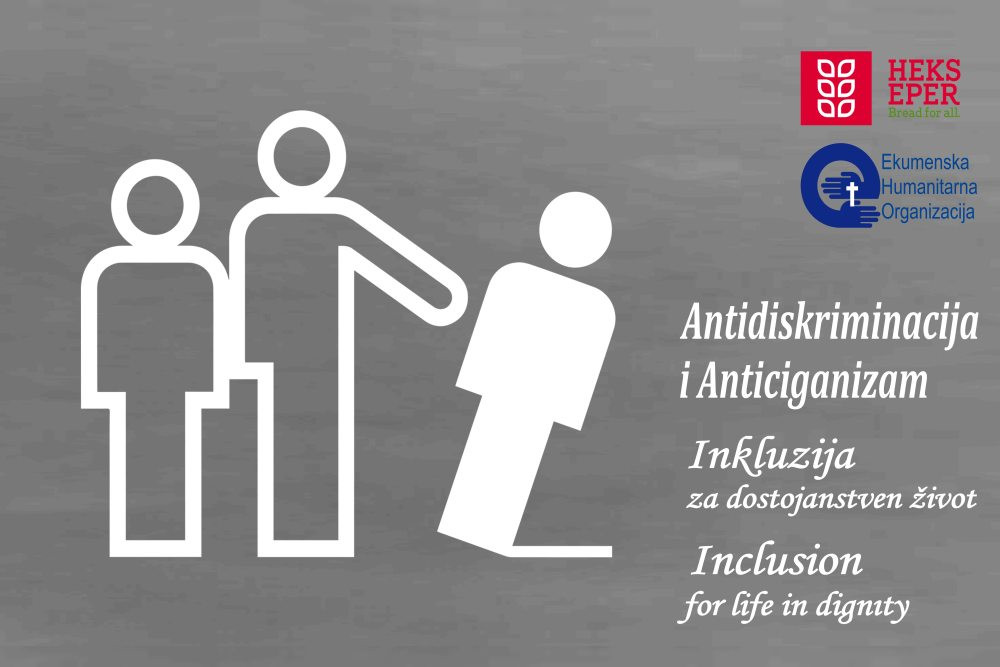Social inclusion for a dignified life of Roma and other vulnerable people in Serbia 2023-2026

With the vision of enabling Roma and members of other vulnerable groups in Serbia to enjoy their social and human rights without discrimination, the Ecumenical Humanitarian Organization is implementing a new cycle of a four-year project supported by the Swiss organization HEKS/EPER.
The project aims to contribute to poverty reduction through non-discriminatory, sustainable and socially responsible inclusion of the most vulnerable members of the Roma community and other marginalized persons living in substandard conditions. EHO signed partnership agreements in the implementation of the activities of this project with representatives of seven cities and municipalities: the city of Niš, the city of Kragujevac, the municipality of Velika Plana, the municipality of Kovin, the municipality of Beočin, the city municipality of Zvezdara and the city municipality of Voždovac.
Project Initiative "inclusion for life in dignity and without discrimination" is aimed at changing attitudes towards Roma and other people from vulnerable groups in order to visibly improve their social status. In addition, housing support and support for children in education are provided to residents of selected settlements where mainly Roma and other socially vulnerable families live. Any initiative or support model in line with the project vision initiated and proposed by the partners in this project will be supported by funds provided within this project.
The project is focused on key issues that are known to have a negative impact on the quality of life of Roma and other vulnerable people living in substandard settlements. Activities will be carried out in three areas:
- Discrimination and antigypsyism
- Education
- Housing support in the legalization of houses
A significant part of the activities is aimed at prevention and the fight against discrimination and antigypsyism. Key players in this area are:
- Employees in the media who must be more active in the prevention and fight against discrimination;
- School employees who are in a position to act at the earliest in the prevention of discrimination in schools;
- Roma and other persons who must be empowered to recognize and report discrimination;
- Public servants employed in local institutions where Roma and other socially disadvantaged citizens exercise their social and legal rights;
- Roma associations led by Roma women whose work is aimed at empowering women and young people;
- Young members of the Roma community with potential for advancement and developing new skills;
- National and local institutions that act in the field of prevention and prohibition of discrimination;
- Regional and international associations, organizations and institutions that carry out activities and have experience in the fight against antigypsyism;
In the field of education, we support employees and students of selected schools in their efforts to make schools more inclusive and non-discriminatory, to foster interculturality and to be safe for children. Special support is aimed at Roma girls in the prevention of early school leaving. The best examples implemented in practice will be exchanged between the participants of the selected schools. Key players in this area are:
- Employees in selected schools;
- Pedagogical assistants employed in selected schools;
- Students in selected schools who are at risk of dropping out and their parents;
- Girls from the Roma community who are at risk of early school leaving and their parents;
- Members of teams for professional orientation in selected schools;
In order to create legal prerequisites for improving the quality of housing in substandard settlements, Roma families in the selected settlements will receive support in legalizing their houses and resolving the property status of the land on which the buildings are built. After receiving the decision on the legalization of the buildings, families are directed to the existing types of housing support, for which the property - legal status has been resolved as a prerequisite. Key players in this area are:
- Family members living in substandard settlements on the territory of partner cities and municipalities;
- Officials employed in competent services for the legalization of illegally built buildings;
- Cities and municipalities and/or other organizations with the intention of accessing other sources of financing intended for housing support for the socially vulnerable population;
- National and international organizations that promote and support housing support aimed at Roma and other members of socially vulnerable groups;
The project methodology is based on respect for basic human rights and direct support to members of socially sensitive groups to realize those rights. The established cooperation of EHO with state and local institutions through project activities will contribute to the improvement of existing policies and practices aimed at improving the position of Roma and other vulnerable groups in Serbia.
Project implementation duration: from 1st April 2023 to 31st December 2026.
Partners: HEKS/EPER Switzerland
Projectni Coordinator: Slađana Jovanović > sladjana@ehons.org